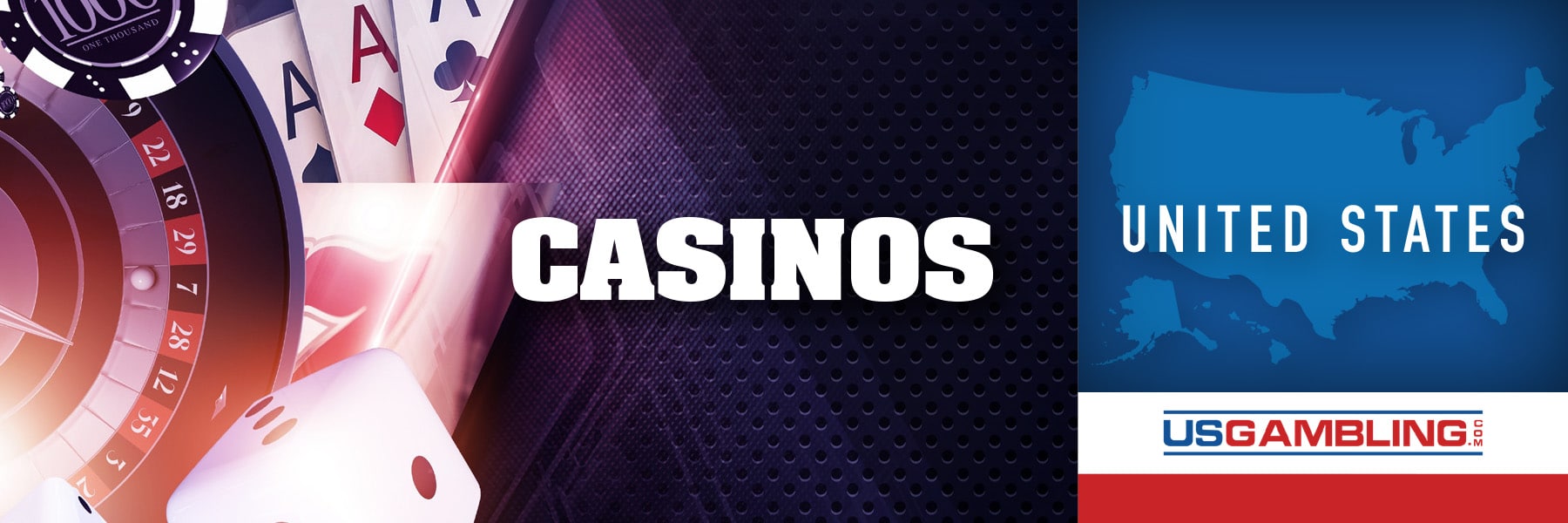US Online Casinos
Public support for gambling has waxed and waned over the many years since the founding of this nation, but never has the industry been stronger than it is right now. Today, gambling revenue is measured in the tens-of-billions of dollars with land-based and online casinos dotting the country from Nevada to New Jersey.
Legal US Casino Sites



21+ to Play, T&Cs Apply. Gambling Problem? Call 1-800-GAMBLER
It’s an exciting time for the US casino industry and we’d like to make one thing clear: we only cover legal casino sites and apps that are licensed to operate in the states they accept players from. We do not acknowledge or endorse offshore casinos that accept US citizens contrary to US law.
Not only is playing at offshore sites rarely a safe and fair experience, but it’s also likely illegal depending on the state you live in.
With that in mind, we only list and recommend operators that offer expressly legal casino games right here in the United States.
Best-Rated US Online Casinos
#1 FanDuel Casino
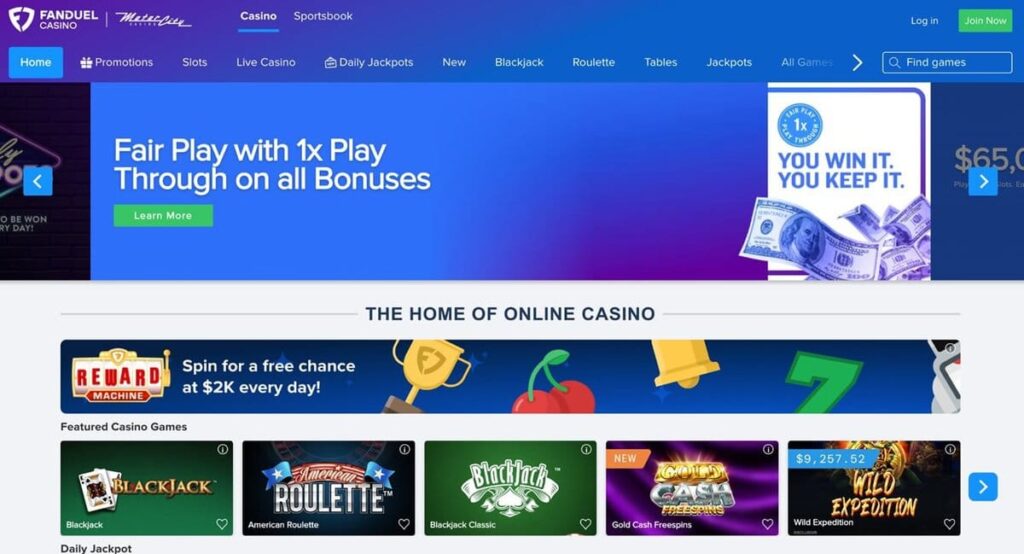
FanDuel launched in 2009 and, like DraftKings, was initially a fantasy sports site before opening an online sportsbook and FanDuel casino that is now available in CT, MI, NJ, PA, & WV. FanDuel has over 400 games to choose from, including an incredible array of slots, including Starburst. You can cash out at FanDuel within 48 hours via credit/debit card, e-wallet, or online bank transfer, and their mobile app and mobile site are superb.
Top Features
- Epic slots from IGT, NetEnt, Microgaming, NextGen Gaming, and Big Time Gaming
- Licensed and legal in CT, MI, NJ, PA, & WV
- Encrypted and very secure online casino
- Receive your winnings in as little as 24 hours
- World class sportsbook where you can bet all NFL, NBA, MLB games live
#2 BetMGM Casino
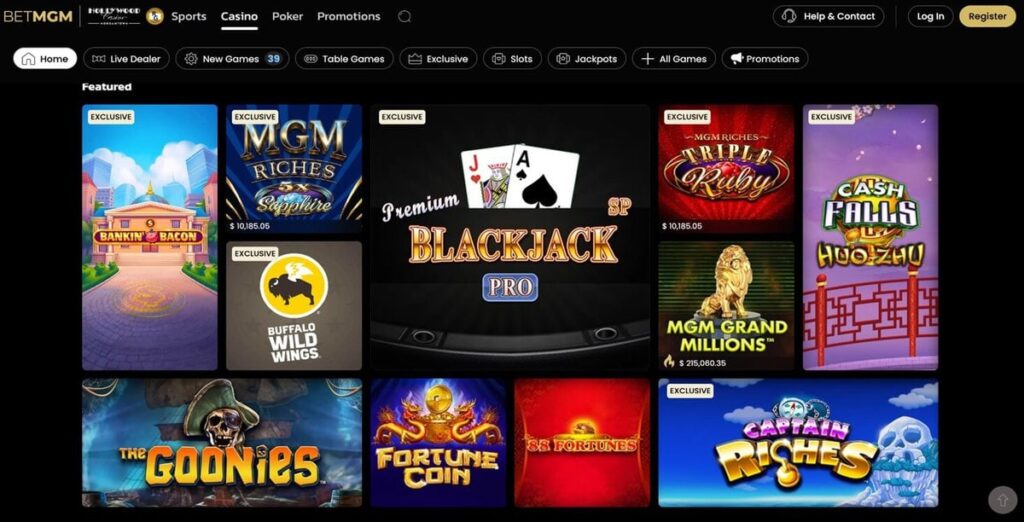
BetMGM, launched in 2018, is owned by MGM Resorts, one of the biggest names in gaming, and is available in MI, NJ, PA, & WV. BetMGM Casino has over 800 games from the likes of Microgaming, NetEnt, Playtech, IGT, Red Tiger, Everi, High 5 Games, Evolution Gaming and Ezugi, and offers fast and free banking methods, including Skrill, PayPal, Mastercard, and Visa.
Top Features
- Games from leading developers including Microgaming, NetEnt, Playtech, and Evolution Gaming
- Well-designed and ultra-responsive mobile optimized site
- Super simple and fast registration process
- Available in MI, NJ, PA, & WV
#3 Caesars Online Casino
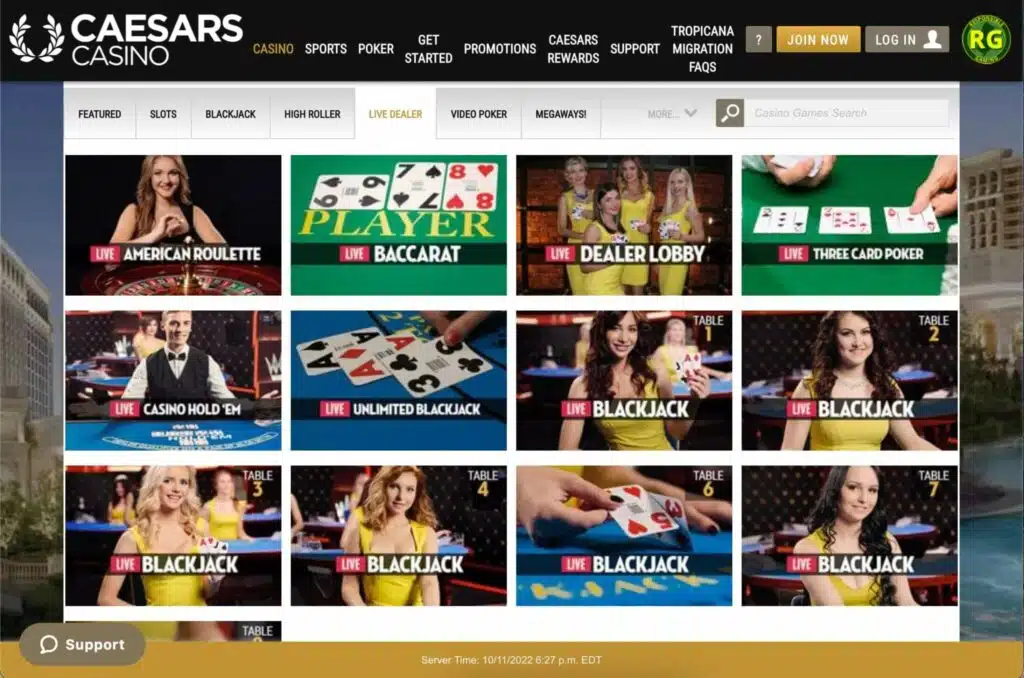
Caesars Casino is brought to you by Caesars Entertainment, which runs over 50 casinos and is the 4th largest gaming company on the planet. Caesars Casino is available in NJ, MI, WV & PA and features 500 + games, including live dealer games and tons of exciting slots like Bonanza Megaways.
Top Features
- Incredible live popular casino games, including live blackjack and roulette
- Available in NJ, MI, WV, and PA
- 24/7 customer support via live chat + email
- Tons of payment options including ACH, PayPal, CaesarsCasino.com prepaid card
#4 BetRivers Casino
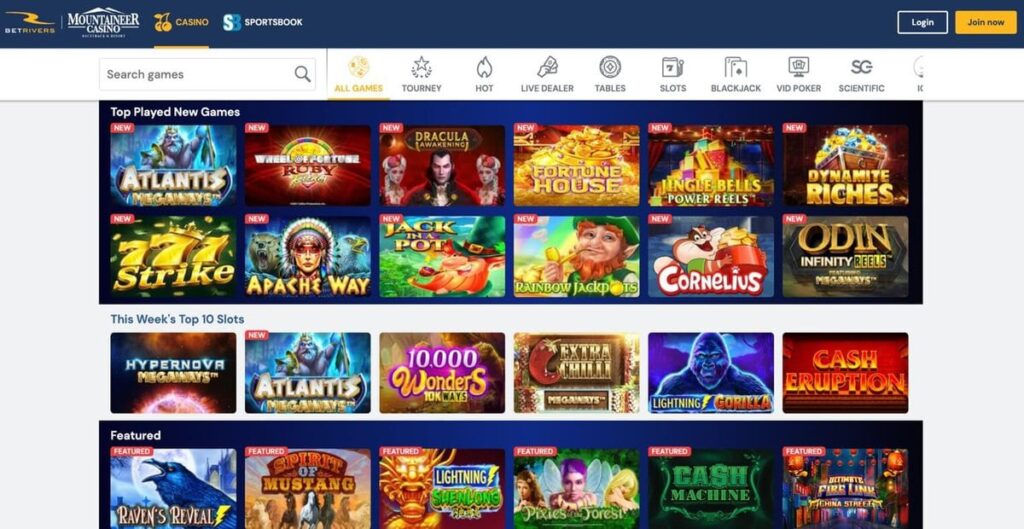
BetRivers is ready to take your bets as long as you are in MI, NJ, PA, or WV after launching back in 2019. BetRivers has sleek native apps for Android and iOS that gives you total functionality and lets you play casino games on the go. They have great high RTP slots from NetEnt, IGT, Everi Games, and Konami like Gonzos Quest, and some serious bonuses.
Top Features
- Well-designed app for iOS and Android
- Available in MI, NJ, PA, and WV
- Great slots from NetEnt, IGT, Everi Games, and Konami
- Impressive range of video poker games like Double Bonus Poker + Joker Poker
#5 DraftKings Casino
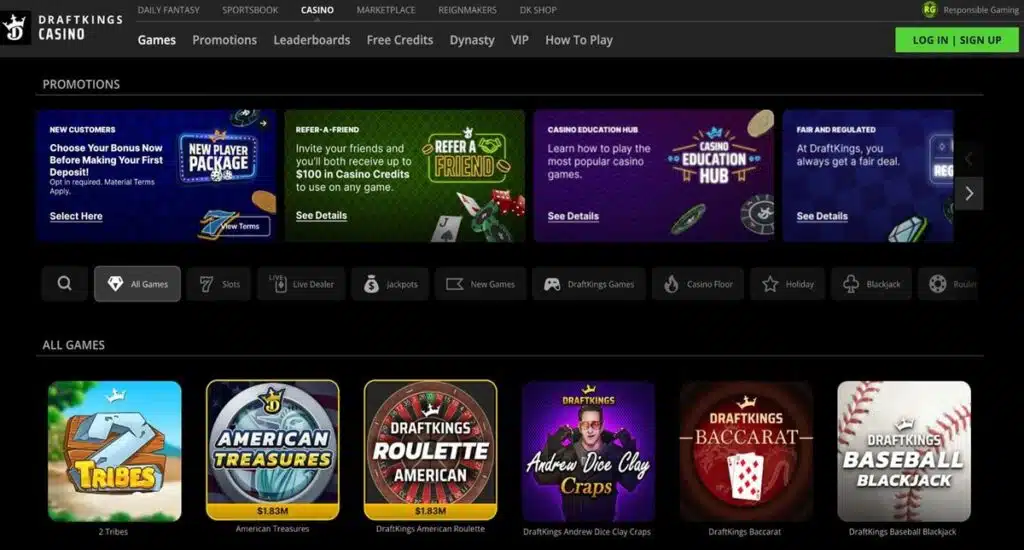
DraftKings was founded in 2012 and started as a daily fantasy sports site before expanding to online gambling in CT, MI, NJ, PA, & WV. DraftKings has over 1,000 games, including live titles, slots, and blackjack, produced by top developers like NetEnt, Microgaming, IGT, and Big Time Gaming. They have a custom-built app for iOS and Android, a mobile-optimized site, and tons of generous DraftKings bonuses with low wagering requirements. If you ever have any issues, they offer 24/7 customer support via live chat.
Top Features
- 800 + Games – Slots, video poker, blackjack, roulette, live dealer games
- Games from incredible software providers – NetEnt, Microgaming, IGT, Big Time Gaming, Nextgen Gaming
- Fast cashouts – Receive your winnings within 48 hours
- Available in 5 US states (CT, MI, NJ, PA, & WV)
Legal Online Casinos In The USA
US residents have been visiting online casinos since the late 90s, but it wasn’t until 2013 that the first licensed casino sites opened in New Jersey and Delaware. Changes to federal law in 2011 paved the way for states to legalize and regulate online casinos.
New Jersey and Delaware were first out the gate with casino sites approved in 2013. In both states, online casinos operate off licenses issued to land-based operators. In New Jersey, for example, most of the major Atlantic City casinos now operate at least one online casino that accepts players from around the state.
Online casinos are legal and regulated in the following states:
Lawmakers in other states have introduced similar legislation and are likely to join the party at some point as well.
In states that don’t yet have legal online gambling, sweepstakes casinos provide a close alternative. Sweepstakes gambling sites are available in most of the USA and offer:
- Large menus of casino-style games
- Real cash prizes
- Mechanisms to participate for free
Legal Online Casino Reviews
As more states legalize online casinos in the USA, it’s important to evaluate each brand as to the overall safety and reputation of the operator. We compare the features of each casino, available game types, banking, and payment processing, and the value of casino bonuses and promotional signup offers for new players.
- BetMGM Casino
- DraftKings Casino
- Harrahs Casino
- Mohegan Sun Casino
- Ocean Online Casino
- Hard Rock Bet Casino
- Bet365 Casino
- Betway Casino
- Fanatics Casino
- Scores Casino
- Virgin Casino
- Tropicana Casino
- Golden Nugget Casino
- Borgata Online Casino
- FanDuel Casino
- BetRivers Casino
- Hollywood Casino
- Party Casino
How We Review Online Casinos
Every online casino we review, we personally test via a rigorous process that involves analyzing all aspects of the site. Our team takes the time to download apps, create accounts, claim bonuses, play games, and contact the support team to check their response time. We use a standardized review process to accurately compare online casinos, which we will explore in depth later.
Our goal is to keep users safe and provide the most accurate online casino reviews out there! We also occasionally receive affiliate commissions from online casinos we promote. However, this does not jeopardize our journalistic integrity as we only choose to partner with betting sites that meet our strict rating criteria.
Our 10-Step Casino Review Process

1. Conduct Background Check

Before we even think about signing up to an online casino, we put on our detective caps and start digging into the background of the site. Our team looks at the current iGaming licenses the site holds, whether they can legally operate, and if the casino has had any issues with gaming authorities in the past, such as non-compliance or having a license application rejected.
Our team also looks into the online casino’s reputation. We study user ratings and see what issues people have had. Then finally, we investigate the online casino’s holding company and top executives. If it is a public company, we look at filings and financial statements to get a feel for the overall health of the company.
2. Test Demo Games
Once we are satisfied the online casino is legit and fully licensed, we pull up their website.
We explore the website’s theme, functionality, navigation, and usability. If possible, we test different games in demo mode. During this stage, we are looking for any glaring weaknesses like outdated themes, slow loading speed, and lack of/ poor quality games. If we can honestly envision ourselves playing at this online casino, then we continue our review process.
3. Sign Up for an Account
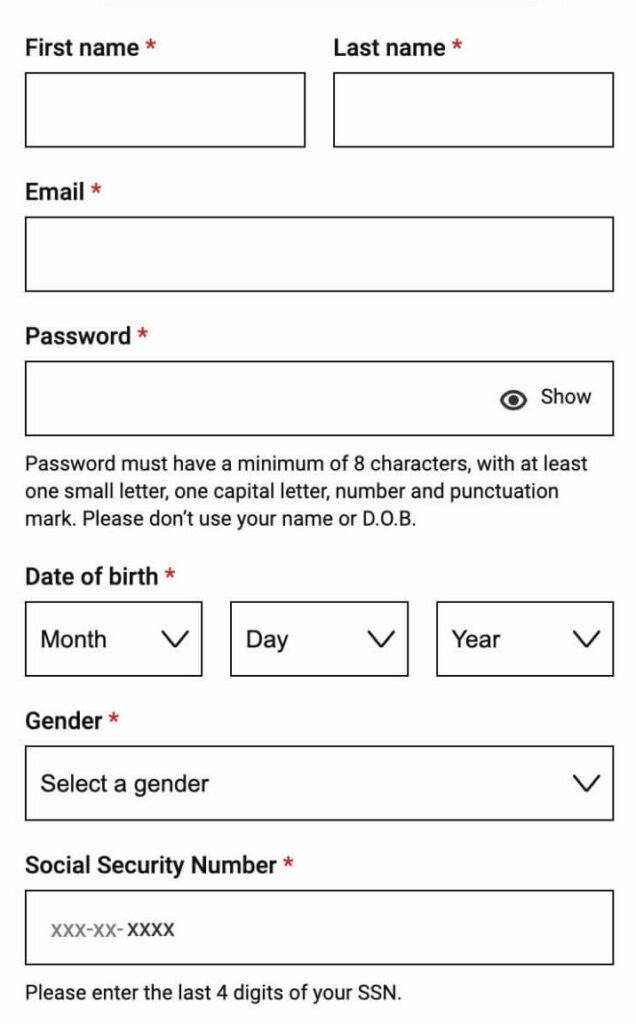
Once we have checked that the online casino has a functioning website and appears professional, it is time to make an account. We personally register at all real money casinos we review, and yes, we have completed more registration forms than we care to admit.
When signing up at an online casino, we take note of:
- Start-to-finish registration time
- Customer identity verification process
- Verification documents required (proof of address, photo ID, etc.)
- Identity verification document processing speed
4. Download the Casino App
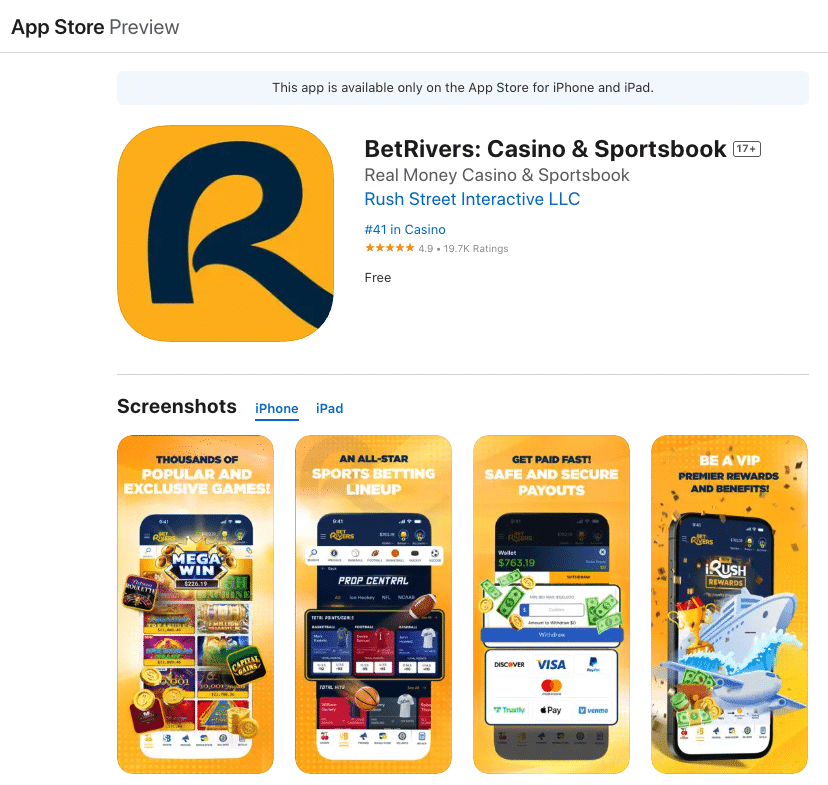
Now our account is up and running, we pop over to the App Store and Google Play and see whether the casino’s app lives up to the hype. When testing mobile apps, we are looking at overall ease of use, loading speed, the number of casino games available, and whether mobile players get any special bonuses or perks.
If the online casino doesn’t have an app, we open their mobile site and test out its overall functionality and see if mobile players get the same features as desktop players.
5. Claim No Deposit Bonus
If the online casino has a no-deposit bonus, we claim it. We put the no-deposit bonus to use on our favorite slots and, if allowed, a few hands of blackjack. When reviewing a site’s no-deposit bonus, we consider:
- The ease of claiming
- Total bonus size
- Whether there is a max win limit
- Withdrawal conditions
- Other terms like wagering requirements, game restrictions, and expiry dates
6. Make a Deposit + Claim Welcome Bonus

After squeezing everything we can from the no-deposit bonus, it is time to part with our precious cash and make a deposit. We go through the whole process of typing in our payment details. When making a deposit, we are looking at:
- Available payment methods
- Deposit fees
- Processing speed
When making our first deposit, we also claim the welcome bonus. Similarly, when analyzing the no-deposit bonus, we look at the ease of claiming, how long it takes to receive the bonus, the size, and all of the tricky little terms and conditions sites attach.
7. Play Real Money Games

Once our account is locked and loaded with funds, including hopefully a juicy welcome bonus, it is time to dive into the online casino’s game selection.
When testing games, we make sure to play a wide range of slots, table games, specialty games, and live dealer games. We make special note of:
- The number of titles
- Range of game types and styles
- Software providers
- Betting limits
- Return to player figures (RTP)
- Jackpots
- Max wins
- Graphics and overall playing experience
8. Contact Customer Support
It is all well and good for an online casino to claim they offer 24/7 professional customer support, but it is another thing to actually deliver on this promise. To put online casinos to the test, we personally contact customer support via all available channels, including live chat, email, and telephone.
We make the support agents earn their pay by asking all kinds of questions ranging from simple to complex. We also try our luck and attempt to score additional bonuses. When contacting customer support, we are looking at speed of reply, overall professionalism, and effectiveness in solving issues.
9. Investigate VIP Program

After we have annoyed customer support enough, it is time to check out what features VIP players can enjoy at the online casino.
When analyzing gambling VIP programs, we consider:
- Loyalty points earned per $1 wagered
- Points-to-cash conversion rate
- Ease of progressing through VIP tiers
- Whether the program has a VIP store where you can purchase merchandise, travel packages, etc.
- Any additional perks regular players can realistically receive (e.g., VIP hosts, custom casino bonuses, and invitations to exclusive events)
10. Cash Out

In the final step of our online casino review process, we request a withdrawal, paying close attention to the number of payment options available, withdrawal limits, whether there are any fees involved, and the processing times.
It is a major red flag if the online casino takes forever to process withdrawals and is constantly coming up with a new excuse on why they can’t initiate the transaction.
New Jersey Online Casinos
New Jersey Quick Facts:
- First online casinos launched: 2013
- Online gaming regulator: NJ Division of Gaming Enforcement (NJDGE)
- Types of online gaming offered: slots, table games, poker, sports betting, horse racing, and bingo
Licensed Operators and Casino Partners:
- Borgata Hotel Casino & Spa: BorgataCasino.com, BorgataPoker.com, PartyCasino.com, PartyPoker.com, PalaBingoUSA.com, PalaCasino.com, PalaPoker.com, PlayMGMCasino.com, PlayMGMPoker.com, ScoresCasino.com
- Caesars Atlantic City Hotel & Casino: CaesarsCasino.com, HarrahsCasino.com, WSOP.com
- Golden Nugget Atlantic City: GoldenNuggetCasino.com, BetfairCasino.com, PlaySugarHouse.com
- Hard Rock Hotel and Casino: HardRockCasino.com, Unibet.com, Bet365.com
- Ocean Resort Casino: OceanOnlineCasino.com
- Resorts Casino Hotel Atlantic City: ResortsCasino.com, MoheganSunCasino.com, PokerStarsNJ.com, FOXBet.com, DraftKings.com
- Tropicana Casino & Resort Atlantic City: TropicanaCasino.com, VirginCasino.com
- Meadowlands Racing & Entertainment: Sportsbook.FanDuel.com, PointsBet.com
- Monmouth Park: NJ.US.WilliamHill.com, theScore.bet
New Jersey is home to a bustling online gambling industry that provides the state with millions in tax revenue every month. This is by far the largest online gaming market in the US thanks in equal parts to a large population, reasonable tax rates, and regulations that support a competitive operating environment.
Land-based casinos hold all online gaming licenses under New Jersey regulations and may partner with third-party software providers to operate multiple gaming sites that are individually branded. Generally, the way it works is each casino operates one gambling site under its own name and then partners with other providers to operate additional gambling sites under different brands.
For example, Golden Nugget operates GoldenNuggetCasino.com and PlaySugarHouse.com among others. Both sites operate off the original Golden Nugget license but also compete with one another as each is powered by a different software provider.
By organizing the industry in this manner, New Jersey has set the stage for a competitive environment. Even though only seven land-based casinos have acquired online gambling licenses in New Jersey, they have combined to launch more than two dozen individual gambling sites altogether.
What this all means for you as the customer is you have your choice of licensed, legal online casinos that are all seeking to outdo one another in terms of game selection, promotions, VIP programs and payout odds. New Jersey really does serve as an example of a state getting it almost exactly right when it comes to fostering a functional online gaming industry.
Delaware Online Casinos
Delaware Quick Facts:
- First online casinos launched: 2013
- Online gaming regulator: DE Division of Gaming Enforcement (DGE) and DE Lottery
- Types of online gaming offered: Slots, table games, and poker
Licensed Operators and Casino Partners:
- Delaware Park: https://www.delawarepark.com/igaming/
- Dover Downs: OnlineGaming.DoverDowns.com
- Harrington Raceway: https://www.harringtongamingonline.com/
Delaware passed legislation in 2012 authorizing the state’s three racetrack casinos to open online casinos and poker sites. Delaware Park, Dover Downs and Harrington Raceway launched online gaming the following year and serve as the only licensed providers in Delaware.
Online casinos in Delaware offer a full range of real money table games, slots, and poker, but the market here is not nearly as developed as it is in New Jersey due to the Delaware Lottery granting online gaming company 888 a monopoly over the operation of online gambling in the entire state.
For players, this means there are few distinguishing features between each of Delaware’s three casino sites. Each offers the same basic lineup of casino games and promotions, so it makes little difference which one you choose. The overall experience is similar across the board.
Pennsylvania Online Casinos
Pennsylvania Quick Facts:
- First online casinos launched: July 2019
- Online gaming regulator: PA Gaming Control Board (PGCB)
- Types of online gaming offered: Slots, table games, poker, sports betting, and lottery
Licensed Operators and Casino Partners:
- Parx Casino: pa.parxcasino.com
- Sands Casino Resort Bethlehem
- SugarHouse Casino
- Rivers Casino Pittsburgh
- Rivers Casino Philadelphia: pa.playsugarhouse.com, pa.betrivers.com
- Hollywood Casino: barstoolsportsbook.com, pa.hollywoodcasino.com, casino.draftkings.com, casino.pa.betmgm.com
- Mount Airy Casino: starsmtairycasino.com, pokerstarsmtairycasino.com, FOX Bet mobile app
- Mohegan Sun Pocono: pa.unibet.com/mohegansun/casino
- Valley Forge Casino Resort: casino.fanduel.com/?partner=valleyforge
- Harrah’s Philadelphia Casino: pa.caesarsonline.com
- Presque Isle Downs & Casino: pa.betamerica.com
- Stadium Casino: playlive.com
- Golden Nugget PA (standalone online operator)
- Wind Creek Bethlehem: play.windcreekcasino.com
- Roar Digital LLC: (standalone online operator: PartyPoker)
Pennsylvania approved online casinos as a part of a large gaming reform bill passed in 2017 that also legalized sports betting (online and in-person), online poker, and online lottery games. The Pennsylvania Gaming Control Board is in charge of approving online gambling licenses, and state law enforces a minimum age of 21 to play online.
The Pennsylvania Lottery also offers online versions of its instant-win scratch games via PAiLottery.com. The instant win games offered by the PA Lottery resemble slots at first glance (a fact which caused quite a dust-up with the local casino industry), but function just like the scratch-off games one can find at any gas station with a few added graphics and animations.
Between casino games, sports betting, and the lottery all going online, Pennsylvania has established itself as a major online gaming market. Residents now have access to a full suite of online gaming provided by licensed operators.
Michigan Online Casinos
Michigan Quick Facts:
- First online casinos launched: Anticipated for early 2021
- Online gaming regulator: MI Gaming Control Board (MGCB)
- Types of online gaming offered: Slots, table games, poker, and sports betting are approved
Licensed Operators and Casino Partners:
- MGM Grand Detroit: casino.mi.betmgm.com
- Little River Casino Resort: mi.betrivers.com
- Bay Mills Resort & Casino: draftkings.com
- MotorCity Casino: fanduel.com
- Northern Waters Casino Resort: mi.pointsbet.com
- Turtle Creek Casino: williamhill.com/us/mi/
- Leelanau Sands Casino: williamhill.com/us/mi/
- Island Resort & Casino: twinspires.com
- Ojibwa Casinos: mi-casino.goldennuggetcasino.com
- Greektown Casino: barstoolsportsbook.com
- Kewadin Casinos: mi.wynnbet.com
Michigan legalized online gambling, poker, and sports betting through a bill approved near the end of 2019. The new MI online gambling law allows land-based casinos to apply for licenses to operate up to two gambling or poker sites each.
State law sets a minimum age of 21 to participate and gives regulatory power to the Michigan Gaming Control Board. Casinos are authorized to partner with third-party providers, which means major names in online gambling and poker (think PokerStars and BetMGM) will be permitted to enter the market as long as they are able to reach agreements with local casino operators.
West Virginia Online Casinos
West Virginia Quick Facts
- First online casinos launched: Mid-2020
- Online gaming regulator: WV Lottery Commission (WVLC)
- Types of online gaming offered: Slots, table games, poker, and others as approved by the WVLC
Licensed Operators and Partner Casinos:
- Hollywood Casino at Charles Town Races: DraftKings Casino
- Casino Club at the Greenbrier Resort: BetMGM Casino, Golden Nugget Casino
- Wheeling Island Hotel Casino Racetrack
- Mountaineer Casino Racetrack & Resort: BetRivers Casino
- Mardi Gras Casino
West Virginia legalized in-person and online sports betting in 2018 and then followed that up with a bill in 2019 to authorize online casinos. HB 2934, first introduced in February 2019, allows each of the state’s five casinos to apply for a license to offer “interactive wagering” for players 21 or older and located within state lines.
WV online gambling is regulated by the Lottery Commission (WVLC), which is also responsible for passing additional regulations as needed. Under state law, casinos must pay a $250,000 licensing fee, and revenues are taxed at 15%.
Connecticut Online Casinos
Connecticut legalized online gambling in 2021 via HB 6451.
The law also authorized online sports betting, daily fantasy sports, and online poker. Unfortunately, only two online casinos operate in Connecticut:
- DraftKings Casino CT
- Mohegan Sun Casino CT (FanDuel Casino)
Online Casino Deposit Methods
Online casinos in the United States accept a range of convenient deposit methods that are generally pretty straightforward and easy to use. The exact list of funding methods varies from state to state and amongst operators, but the list below offers some of the most common ways to deposit and withdraw at popular US casino sites:
- Credit Cards and Debit Cards: Most casinos accept Visa and MasterCard
- PayPal: Some casinos accept PayPal, can be used to deposit and withdraw
- eCheck: Transfer money straight from your bank account to your casino account – works for deposits and withdrawals
- PayNearMe: New deposit method that has caught on in popularity across the US – can be used to fund your account with physical cash at your nearest 7-Eleven
- Online Banking Bill Pay: If you have online banking at one of the major national banks, you can use your bill pay feature to fund your gaming account without sharing your banking details with the casino
- Cash at the Cage: Most online casinos can also be funded by visiting the land-based partner to deposit cash in person at the actual casino
One of the key reasons it is important to play at licensed US casinos is they must conform with security standards to ensure your payments are processed safely and customers’ private information is protected.
For the most part, making a deposit at a licensed online casino is as easy as buying something online from Amazon. However, there is still one issue related to US casino deposits and withdrawals that continues to complicate payments in the industry.
Players’ banks still block a significant percentage of credit and debit card deposits due to their association with gambling.
Even in states where online casinos are expressly legal, some banks and payment processing companies refuse to process transactions due to vague banking regulations dealing with online gaming. This issue should clear up over time as the industry settles in and banks grow more comfortable processing gaming transactions.
Thankfully, the next best option to funding your casino account with a credit or debit card is using an e-wallet like PayPal or funding your deposit with a checking account transfer from your bank account.
PayPal accounts can be funded with credit or debit (zero rejections), and then you can easily use PayPal to complete the deposit to your casino of choice. eChecks at US casinos also work well because they only require a standard bank account.
Fastest-Paying Online Casinos
Speed is essential when playing online, and the amount of time it takes to collect your winnings is crucial. You don’t want to be waiting too long after you have just won a massive jackpot for it to reach your bank account. So, how long does it typically take to withdraw your winnings? With prepaid cards like Play+, you could get your hands on your cash within hours rather than days. Essentially, you could have your money instantly.
You must start by depositing at a well-known fast-paying USA online casinos to get access to these rapid withdrawals. Then you will need to register your Play+ card. Finally, select Play+ (or your online casino’s branded card) when it comes to withdrawing your cash. When the funds land in your account a few hours later, you can use them at places that accept Discover. Alternatively, you can get cash from any ATM on the NYCE or PULSE network.
Types of Online Casino Games
Nearly every legal gambling site in the USA offers the same types of games guests would find on the casino floor at any major resort, except tweaked for online play.
Online Slots
The best US casino sites offer hundreds of slots with numerous variants to choose from. In addition, there will be 3-reel machines, penny slots, and Megaways offering thousands of ways to win. Most US gambling sites also feature a collection of progressive slots featuring top prizes worth millions of dollars.
Live Dealer Blackjack
Online blackjack games offer fantastic house edges. In some instances, the house only has an advantage of 0.1%. When playing at US online casinos, you will discover software-based and live dealer versions of the traditional table game. Live blackjack tends to be more popular as it provides an extra layer of immersion while playing.
Live Dealer Roulette
The most prominent US online casinos invariably offer a mix of digital and live dealer roulette, often in multiple formats including European, American, Lightning, and Auto. Some of the best gambling sites even offer live dealer roulette games streamed from tables located on the casino floor at major destination resorts.
Online Video Poker
This is based on five-card draw poker. The game uses a standard 52-card deck, and once you make your bet and press the deal button, the machine randomly gives you five cards. It follows the same core gameplay as the traditional game. There are several video poker variations to the classic game, with subtle differences in the gameplay (wilds) and the number of hands being played simultaneously, but all follow the same basic rules.
Real Money Online Slots
Legal US gambling sites devote more attention, time, and promotional efforts to online slots than any other casino game. Highly quality slots sites regularly introduce new titles offering:
- Extensive bonus rounds that can significantly boost payouts
- Multiple paylines
- Novel bonus features like sticky wilds and sticky multipliers
Players can also play classic three-reel slots or high-paying progressive jackpot slots, with some offering millions in returns.
Best Online Casino Software Providers
Most US online casinos feature games from multiple software vendors, including exclusive titles developed in-house in some cases.
Each of the developers listed above has particular strengths. For example, IGT offers slots that cover renowned brands like Wheel of Fortune and Monopoly. Alternatively, NetEnt is renowned for developing online slots that provide enticing graphics and creative gameplay, such as Gonzo’s Quest and Jack and the Beanstalk.
See our slot developer profiles for more information about the teams behind some of the most prominent US online casino games and how each differentiates its offerings from other software providers.
- NetEnt
- Barcrest
- Play’n GO
- Konami
- IGT
- Scientific Games (SGi/Light & Wonder)
- Blueprint Gaming
- WMS
- BTG (Big Time Gaming)
- Bally
- Red Tiger Gaming
- Evolution
Online Casino Bonuses
As the online market becomes increasingly competitive, USA online casinos offer promos to attract new players and fight off the competition. The most common bonuses you will find at the top US online casinos include:
- Deposit Bonuses: These are the most common bonuses available. In return for depositing, online casinos will match your sum up to a certain amount. For example, claiming a 100% welcome bonus with a $100 first deposit will give you $100 in additional bonus funds.
- Bonus Spins: Bonus spin bonuses give players the opportunity to spin the reels without using their own funds. While they typically are played at the lowest possible denomination, receiving several hundred free spins as part of a welcome offer can give you a great chance of some nice wins. In some cases, bonus spin promotions attach wagering requirements to any winnings, a condition that negatively impacts the offer’s value.
- No Deposit Bonuses: No-deposit promotions offer bonus funds to players just for signing up, with no deposit necessary. However, many so-called “no deposit” bonuses actually require players to deposit funds or meet excessive wagering requirements to withdraw their winnings. Far too often, no deposit casino bonuses are less generous than they appear.
- Cashback: Casino cashback bonuses offer players a percentage of their net losses if they lose money during a predetermined period. For example, a 10% cash back offer on your first week’s losses would return $40 if you end up with a net loss after one week. These promos usually issue cashback in the form of non-withdrawable bonus funds, but players may occasionally find the rare exception that pays refunds as withdrawable cash.
US Gambling Laws and State-Specific Regulations
Gambling law in the United States is dictated at both the federal and state level. Certain federal guidelines set the stage for gambling as a whole across the country, but state laws play the biggest role in determining what forms of gambling are available in each state.
- Federal Gaming Laws
- State-Specific Gaming Laws
Federal Gaming Laws
In recent years, the federal government has relaxed its stance on what types of gaming individual states may authorize. For instance, a DOJ memo in 2011 changed a longstanding legal interpretation of the Federal Wire Act resulted in states gaining the ability to legalize and regulate US online casinos.
In true political fashion, that same memo is now being challenged by the new administration, and the Wire Act remains a confusing issue for operators and regulators until cleared up.
Likewise, the 2018 Supreme Court decision that declared the federal sports betting prohibition unconstitutional granted states the authority to legalize in-person and online sports betting.
Although states bear the majority of responsibility for regulating online gambling, several overarching federal gambling laws still apply:
- Federal Wire Act: The federal wire act prohibits the transmission of wagers across state lines (this law was passed to hamper organized crime groups)
- Indian Gaming Regulatory Act: The 1988 act was enacted to regulate and provide a framework governing gaming on Indian lands. Other purposes of the act were to protect gaming as it was the source of raising revenue for the Indian tribes. It also allowed the opening of Indian casinos in their lands and even in areas where casinos are not traditionally allowed.
- Unlawful Internet Gambling Enforcement Act (UIGEA): The 2006 federal law outlawed financial transactions and services that involved online gambling operators.
- Professional and Amateur Sports Protection Act (PASPA): The law granted a monopoly to Nevada over sports betting. However, the law was repealed in 2018, with the US supreme court allowing all states to decide whether to legalize sports betting within their borders.
State Gaming Laws
While federal law establishes some of the basic guidelines regulating gambling in the USA, each state has significant power in shaping the gaming landscape within its borders.
This arrangement allows every state to regulate gambling in a way that makes sense for its population, but it also makes for a confusing situation with no two states regulating gambling the same way. What’s legal in one state may be prohibited in the next state over, minimum gambling ages vary, and so on.
Although it is useful to have a general idea of what’s going on at the federal level, the most pertinent information as far as what forms of gambling are legal where you live is always going to be found at the state level.
State gaming laws make up the framework for the entire igaming industry landscape. When we move past the federal laws, states have a wide range of latitude in determining what forms of gambling are legal and how real money casino games are regulated.
States hold considerable power in regulating gambling within their borders. It is the state, for example, that determines which forms of gambling are legal, where casinos may be constructed, who may be licensed to operate a casino, whether or not mobile gambling is permitted and much more.
In most states, a state-run gaming commission is tasked with forming the rules and regulations that govern the industry. State gaming commissions enforce tax rates, determine minimum payout percentages, set maximum wager sizes, and much more.
Some states allow open competition among commercial casino operators while other states operate a monopoly or have an agreement with Native American tribes to operate casinos on tribal land. We explore the differences between all types of operators and establishments across the country.
Lest we get too bogged down in the details, the point is this: casino laws and regulations vary significantly from state to state. Our state-specific guides help explain the legal situation in all 50 states.
How Online Gambling Benefits States
States and their residents see three major benefits when online casinos are properly regulated. The state itself benefits from increased tax revenues that can be put to productive causes, each state’s existing casino industry stands to benefit from the increased economic activity and residents benefit by having safe, licensed online casinos to visit.
Tax Revenue
The biggest and most obvious benefit provided to the state is tax revenue. Any time lawmakers can generate new income for the state without raising taxes on existing industries, they’ll be tempted to do exactly that.
The tax revenues generated from online gambling can range from minimal to substantial depending on numerous factors such as state population, tax rates, and how the state regulates the industry.
For example, New Jersey fosters a competitive and healthy online gaming environment that produces sizable tax revenues every year. Each of the state’s land-based casinos is permitted to run multiple gaming sites that compete with one another. This in turn pushes casino operators to innovate and work that much harder for customers.
Additionally, state regulations allow online casinos to offer most games and a reasonable 15% tax rate allows licensed casinos to remain competitive with illegal offshore gambling sites.
The New Jersey model has so far proven quite effective at generating tax revenue for the state, with online gaming delivering significant tax revenue every year.
Delaware, on the other hand, has proven less effective when it comes to raising tax revenue for the state. Even accounting for the fact that Delaware’s population is barely 10% that of New Jersey’s, the Delaware model has provided lackluster revenue for the state with online casinos failing to hit the original $5 million in annual revenue target.
In Delaware, the state lottery operates all three casinos and has a monopoly over gaming. Each of the three casinos is run by the same software provider and there is no real competition between the three since they are all overseen by the Lottery. Additionally, the state taxes 100% on the first $3.75 million in online revenue and takes 43.5% from online slots and 29.4% from online table games after that.
Delaware’s three online casinos have been averaging roughly $215,000 per month in revenue in recent years, which places them firmly in 100% tax territory. With Delaware’s casinos making exactly nothing from online gaming, they have little incentive to upgrade their platforms or invest much in marketing.
The point here is not to pick on Delaware but to demonstrate how tax rates and regulations play a critical role in how much online gambling benefits the state. The benefit to the state varies by a wide range as we’ve seen with New Jersey’s online casino market flourishing while Delaware’s continues to underperform expectations.
Supporting the Local Industry
States also boost their local gaming industries with legal online casinos. Contrary to arguments occasionally made by anti-gambling groups, online gambling does not cannibalize land-based revenue.
If anything, online gaming boosts land-based revenue by deepening the relationship between casinos and their customers and by reaching customers who would otherwise find it inconvenient to visit a casino in person.
Even as online gaming tax revenue has increased in recent years in New Jersey, so too has tax revenue from land-based operations. New Jersey serves as a great case-in-point that online casinos can benefit state coffers without cannibalizing land-based casino revenue.
Additionally, legalization provides second-order benefits, such as new tech jobs, licensing deals between game developers and pro teams, and more.
Consumer Protection
Something gambling opponents tend to forget is that online gambling already happens in states that have not passed legalization measures. Players in states without licensed casino sites still have fairly easy access to offshore casinos that operate with almost zero regulatory oversight. While it is true the UIGEA has disrupted payments, determined players do still find ways to fund their offshore gaming accounts.
Horror stories abound of offshore casinos refusing to honor withdrawals for vague reasons and even occasionally disappearing altogether with players’ funds. In those cases, the customer has absolutely no recourse, no authority to turn to for assistance, and little hope of ever recovering those funds.
Responsible gambling measures are also sorely lacking in the offshore industry. This may not seem like such a big deal for some of you reading this right now, but we have to be honest with ourselves. Some small percentage of people are going to need help identifying when they’ve gambled too much and stopping when it’s time to stop.
To those who oppose online gambling, remember these issues are going to persist whether or not it is legal. Legalizing online casinos may indeed lead to more people playing online, but it will also provide those who need help the most with the resources to get that help. Every state with legal online casinos imposes strict regulations on operators regarding the treatment of players’ funds and dealing with signs of problem gambling.
If done right, legalization and regulation funnel players away from unlicensed offshore gambling sites and onto licensed casinos in the US that operate under the watchful eye of that state’s gaming regulator.
How Licensed Online Casinos Support Responsible Gambling
Legal gambling sites encourage responsible gambling by training employees (particularly customer service agents) on the warning signs of gambling problems and how to address them. On the front end, licensed online casinos offer numerous tools that customers can use to emphasize smart RG practices:
- Deposit Limits – Set limits restricting how much you can deposit over a specific time period.
- Wagering Limits – Decide in advance how much you want to be able to wager over a selected time period. Once you’ve reached that limit, the operator will automatically disable your account from being able to wager more until the time period has concluded.
- Reality Checks – These alerts will pop up to remind you how long you’ve been playing, how much you’ve wagered or how much you are up or down. They help you keep track of your gambling.
- Self-Exclusion – A self-exclusion is a protocol put in place at the player’s request, whereby the casino will take action to prevent the player from re-accessing their services for an agreed length of time.
- Statewide Self-Exclusion Programs – Connecticut, Michigan, New Jersey and Pennsylvania all offer statewide self-exclusion programs. These programs allow a player to register their details with the state to be barred from all gambling services provided in the state. Ensure you check the details, though. Some of these programs only cover offline gambling or require a separate registration for online gambling.
How US Online Gambling Was Legalized
The legalization of online casinos in the United States was more of a process than a singular event. In fact, it is a process that’s ongoing to this day due to individual states possessing the authority to regulate online gambling as they see fit.
The Early Years: Unregulated Internet Casinos
To understand how it all happened, we have to go back. Way back to the mid-90s when the first online casinos hit the internet. State and federal gaming laws in those days had no mechanism to address online gambling because most of those laws were written well before the internet was even a thing.
The growth of online gambling through the late 90s and early 2000s resulted in lawyers and judges attempting to apply outdated gaming laws to an entirely new technology. At the federal level, the law relied upon most heavily to deal with online gambling was the Federal Wire Act of 1961.
The key text of the Wire Act that was used to reign in online gambling at that time reads as follows:
Whoever being engaged in the business of betting or wagering knowingly uses a wire communication facility for the transmission in interstate or foreign commerce of bets or wagers or information assisting in the placing of bets or wagers on any sporting event or contest, or for the transmission of a wire communication which entitles the recipient to receive money or credit as a result of bets or wagers, or for information assisting in the placing of bets or wagers, shall be fined under this title or imprisoned not more than two years, or both.
Strong arguments were put forth that the Wire Act was written to address sports betting specifically, but the Department of Justice at the time interpreted the Wire Act as applying to all forms of online gambling.
You will notice, however, that the Wire Act does not mention penalties for people who merely place wagers online; the Wire Act targets the business of gambling, not the act of participating.
This interpretation of the Wire Act set the stage for how online gambling would be treated in the US during those early years. While it was clearly illegal under federal law to operate an online casino in the United States, there was no penalty for playing at one.
With the demand for online gambling unabated in the United States, certain enterprising entrepreneurs figured a way to serve the market, make money in the process and steer clear of legal trouble (for the most part): operate gambling sites from other countries without laws against running such sites and use the magic of the internet to target the US market.
Online casinos, poker sites, and sportsbooks from all around the world gleefully accepted Americans while operating out of the UK, Costa Rica and other locations. The US government’s official position was that those sites violated US law, but the operators of those sites contended the US had no right to impose its laws in countries where online gambling was perfectly legal.
For a time, major operators took full advantage of the situation to offer all forms of online gambling to US residents. These gambling sites openly advertised their wares on TV, sponsored major poker tournaments, and made billions in the process.
The UIGEA Enters the Picture
Things were good for gamblers and operators alike until late 2006 when Congress decided to address the situation once and for all with a new piece of legislation: The Unlawful Internet Gambling Enforcement Act of 2006 (UIGEA).
With US authorities and the Department of Justice have been largely unable to punish offshore operators and unwilling to target players for enforcement, Congress took a different approach to dealing with the issue. Rather than targeting operators directly, Congress passed the UIGEA to target the financial institutions used by players and online casinos to transfer money.
In short, the UIGEA requires all financial institutions in the US to make a good-faith effort to identify and block all payments connected to “unlawful Internet gambling. Nearly every payment passes through a financial institution at some point when entering or leaving the US – and those institutions are now mandated by federal law to block those payments.
The UIGEA has fallen far short of complete effectiveness, but it did convince most major operators to stop serving the US market. A handful of offshore casinos still take Americans to this day, but payments are difficult to manage and regulations are completely nonexistent. We’ll come back around to the UIGEA shortly.
The Big Break for Legal Online Gambling
In 2009, officials representing the New York and Illinois lotteries sent a letter to the Department of Justice requesting a legal opinion on whether or not their plans to launch online sales of lottery tickets would be a violation of the Federal Wire Act.
The DOJ sat on the decision for two years but finally issued a memo in 2011 that would have major implications extending far beyond online lotteries in New York and Illinois. In the memo, the DOJ stated that not only were the lotteries’ plans A-OK but that the DOJ would interpret the Wire Act from now on as applying only to sports betting.
The ramifications of the new opinion were wide-ranging because up until 2011, the Wire Act was the only federal law on the books stopping individual states from legalizing and regulating online casinos, poker sites, and practically any other form of gambling except sports betting.
States Take Advantage
It did not take long after the 2011 Wire Act opinion for states to begin taking advantage of the opportunity to legalize online gambling, funnel players onto regulated sites and begin collecting tax money they had been missing out on for so many years.
New Jersey, Delaware, and Nevada all moved quickly to draft and implement laws governing online gambling. New Jersey and Delaware legalized online casinos and poker sites while Nevada opted to legalize online poker only.
As for the UIGEA, that law is still in effect to this day. However, the law provides clear exemptions for online racing betting, daily fantasy sports and any other form of gambling that is legal at the state level other than sports betting. This is why the licensed casinos that have opened in New Jersey, Delaware, and other states since then are unaffected by the UIGEA.
And that is the story of how online casinos were legalized in the United States.
Why Play at Legal Online Gambling Sites
With most US states not allowing online gaming on casinos, there is the urge to hop into the many offshore casinos available in the US. But, as we have always insisted, it is not the best idea to enjoy gambling activities on these sites. Here are the reasons we are against offshore gambling in the US:
- Delayed cashouts: These casinos tend to hold on to your supposed winnings. They may also place loads of unrealistic requirements prompting you to lose money.
- Unfair games: The sites rarely have reputable providers in place. So, only a handful of casino games are available. They also manipulate random number generators (RNG) and lack certifications from independent audit bodies.
- Voiding bonuses: Some will have unrealistic and predatory terms and conditions to ensure you do not enjoy the bonuses.
- Inexistent customer support: When you think you can have issues attended to, you are in for a rude shock. These sites have an inexistent support team.
- Questionable licenses: Most offshore sites use Curacao Government, Costa Rica, and Panama licenses. Others lack licensing information.
Users outside of the legal casino states can instead play at offshore casino sites alternatives called sweepstake casinos. These are legal under federal law due to the way they operate. You can still play online slots and table games and win cash prizes in any of the following:
Land-Based US Casinos
The land-based casino industry in the US is way more developed than online gambling, and the numbers show it. According to the American Gaming Association, revenue generated by the commercial casino industry eclipses $40 billion a year, contributes nearly $10 billion a year in taxes, and supports nearly 2 million jobs.
What’s noteworthy about those figures is they don’t even include revenue numbers from tribal casinos or state lotteries. When we account for tribal gaming, we can safely double those numbers to even begin to get an accurate look at the total economic impact of casino gaming on the US economy.
Suffice it to say, the US casino industry is doing big business these days.
Currently, casino gambling is legal in 40 states. Of those states, 24 have at least one commercial casino while 28 have at least one tribal casino. In total, there are roughly 460 commercial casinos and 490 tribal casinos in operation across the United States right now.
States with legal brick-and-mortar casinos:
| Alabama | Arizona | Arkansas | California | Colorado |
| Connecticut | Delaware | Florida | Idaho | Illinois |
| Indiana | Iowa | Kansas | Louisiana | Maine |
| Maryland | Massachusetts | Michigan | Minnesota | Mississippi |
| Missouri | Montana | Nebraska | Nevada | New Hampshire (charitable gaming rooms with table games but no slots) |
| New Jersey | New Mexico | New York | North Carolina | North Dakota |
| Ohio | Oklahoma | Oregon | Pennsylvania | Rhode Island |
| South Dakota | Washington | West Virginia | Wisconsin | Wyoming |
States without casinos:
| Alaska | Georgia (except one cruise ship casino out of Brunswick) | Hawaii | Kentucky (race tracks offer historical horse racing machines) | South Carolina (except two cruise ship casinos out of Little River) |
| Tennessee | Texas (state gaming law prohibits casino gambling, but there are two small tribal casinos that are contested by the state) | Utah | Vermont | Virginia (voters approved casinos in four cities during the Nov 2020 election – coming soon) |
Major US Gambling Operators
The gaming companies profiled below are among the biggest in the world and collectively employ hundreds of thousands of people. Some are household names; others are fairly limited in geography, but all are likely to enter the online gaming space if they haven’t already.
Operators Originating from the US
Caesars Entertainment
- Established: 1937
- Publicly traded? Yes: CZR
- Corporate website
Caesars Entertainment is a goliath gaming operator with 55 properties spanning the globe and some 65,000 employees. In the US, Caesars operates casinos in Arizona, California, Nevada, New Jersey, Illinois, Indiana, Iowa, Louisiana, Maryland, Mississippi, Missouri, North Carolina, and Pennsylvania.
In addition to operating properties under its own name, Caesars Entertainment owns a number of other high-profile brands in the US including Harrah’s, Horseshoe, WSOP, and Bally’s among others.
Caesars is also active in the online casino and sports betting markets in the US. It first launched CaesarsCasino.com in New Jersey and made clear its plans to enter other states as legislation permits. Caesars Entertainment is also partnered with DraftKings to offer online gaming and sports betting products in states where Caesars operates.
Boyd Gaming
- Established: 1975
- Publicly traded? Yes: BYD
- Corporate website
Boyd Gaming is another major land-based operator with 24 casinos across Nevada, Illinois, Indiana, Iowa, Kansas, Louisiana, and Mississippi. Boyd’s Las Vegas properties tend to be popular among the locals rather than standing as international destinations like the bigger names on the Strip, but this is still a mega operator with billions in annual revenue.
Like the other major US casino operators detailed on this page, Boyd gaming focuses on the regulated online gaming market. Boyd Gaming has separate partnership agreements in place with FanDuel and MGM Resorts to pursue online gambling and sports betting opportunities in the US.
Churchill Downs Inc.
- Established: 1875
- Publicly traded? Yes: CHDN
- Corporate website
Churchill Downs is best known for operating the one and only Churchill Downs racetrack in Louisville, Kentucky that hosts the annual Kentucky Derby. In addition to running race tracks in Illinois and Louisiana, Churchill Downs also operates casinos in Florida, Louisiana, Mississippi, Maine, Maryland, Ohio, and Pennsylvania.
Churchill Downs Inc also operates TwinSpires.com, one of the largest horse racing and betting sites in the US. Churchill Downs operated BetAmerica.com through 2020 but announced in early 2021 that it would merge the company’s sports betting and parimutuel horse wagering platform into TwinSpires.com.
Las Vegas Sands
- Established: 1990
- Publicly traded? Yes: LVS
- Corporate website
Las Vegas Sands is the largest casino operator on the planet by revenue with more than 51,000 employees tending to properties in Las Vegas and Macao.
Despite earning a personal fortune with his brick-and-mortar gambling business, Sheldon Adelson once promised he would spend “whatever it takes” to stop online gambling in its tracks and even convince Congress to pass legislation that would turn back the wheels on every state that has legalized online gaming to date.
MGM Resorts International
- Established: 1962
- Publicly traded? Yes: MGM
- Corporate website
MGM Resorts International operates nearly 30 casino and hotel destinations around the world from Springfield, Massachusetts to Shanghai, China. MGM’s US properties include the MGM Springfield in Massachusetts, MGM National Harbor in Maryland, the Borgata in Atlantic City, MGM Grand Detroit in Michigan, and the Beau Rivage and Gold Strike resorts in Mississippi.
MGM is also making moves in online gambling, which began with the launch of online casino games and sports betting in New Jersey via PlayMGM.com. There are no doubts MGM Resorts has its eye on expanding across the US after striking deals with the MLB, New York Jets, NHL, and others to get the name in front of sports fans around the country.
Wynn Resorts
- Established: 2002
- Publicly traded? Yes: WYNN
- Corporate website
Wynn Resorts is one of the younger major players in US gambling but has solidly established itself as the name of luxury with the Wynn Las Vegas, Encore Las Vegas, Encore Boston Harbor, and three Macau properties that are all known for sparing no expense when it comes to the guest experience.
Wynn Resorts has not been as active in online gaming as some of its competitors but has stated it will be moving in that direction. In 2018, Wynn Resorts joined forces with European sports betting operator BetBull “to pursue sports betting opportunities in the emerging US market.” BetBull operates strictly in the online sphere, so it stands to reason the partnership with Wynn Resorts will also extend to the digital realm.
Eldorado Resorts
- Established: 1973
- Publicly traded? Yes: ERI
- Corporate website
Eldorado Resorts operates more than two dozen casinos across the country, including in states not traditionally known as gambling meccas. Casinos managed by Eldorado can be found in Colorado, Florida, Illinois, Indiana, Iowa, Louisiana, Mississippi, Missouri, Nevada, New Jersey, Ohio, Pennsylvania, and West Virginia.
On the online side of things, Eldorado Resorts has partnered with William Hill in order to expand both companies’ footprints in the regulated online gaming market. Together, Eldorado Resorts and William Hill will pursue in-person, online, and mobile sports betting opportunities wherever permitted by law.
Golden Nugget, Inc.
- Established: 2004
- Publicly traded? No
- Corporate website
Golden Nugget is active in the land-based and online gaming market with no signs of slowing on either front. In the physical realm, Golden Nugget operates casinos in Lake Charles, Las Vegas, Atlantic City, Biloxi, and Laughlin.
On the internet front, Golden Nugget is already established or making moves in New Jersey, Pennsylvania, and beyond. Golden Nugget has been particularly successful in New Jersey as the leading online casino by revenue for several years running.
Penn National Gaming
- Established: 1972
- Publicly traded? Yes: PENN
- Corporate website
Penn National Gaming runs 40 major casinos, race tracks, and off-track betting (OTB) facilities across the country in an operation that comprises nearly 50,000 slot machines, 1200 gaming tables, and nearly 9,000 hotel rooms.
Many of its properties operate under the Hollywood Casino banner across a wide range of states including Colorado, Mississippi, Iowa, Indiana, Illinois, Missouri, Louisiana, Nevada, West Virginia, Ohio, Pennsylvania, Maine, Massachusetts, New Mexico, Texas, Kansas, and New Jersey.
Penn National is also highly active in online gaming as one of the only major gaming brands with a social casino site that serves as a prelude to real money gaming. In 2018, Penn National reached an agreement with online gambling company IGT to operate an online casino in Pennsylvania.
Rush Street Gaming
- Established: 2009
- Publicly traded? No
- Corporate website
Chicago-based Rush Street Gaming is a fairly recent entrant into the casino business, but it is growing quickly and already boasts a small portfolio of licensed online casinos in the US and abroad.
In the real world, Rush Street Gaming operates casinos in Illinois, Pittsburgh, New York, and Philadelphia in addition to numerous hotels and restaurants.
Rush Street Gaming stands out among other major casino operators with a bigger focus on online gaming than most. Not only does Rush Street operate online casinos and sportsbooks in the US, but it also has an international division targeting other markets.
Hard Rock International
- Established: 1971
- Publicly traded? No
- Corporate website
The iconic Hard Rock International brand adorns a wide array of businesses around the world including restaurants, hotels, live music venues, and casinos. On the gaming side of things, Hard Rock operates more than a dozen casinos in North America spanning California to New Jersey.
Hard Rock is actively engaged in online gambling as well, with its first online casino and sportsbook opening in New Jersey. The company’s land-based operations in other states and partnerships with groups such as the Gaming Innovation Group (GiG), the Kindred Group, and Bet365 will serve Hard Rock well as it extends its digital footprint in the United States.
DraftKings
- Established: 2012
- Publicly traded? Yes
- Corporate website
DraftKings launched in 2012 as a fledgling fantasy sports website but now operates as one of the country’s biggest digital-first gaming companies. DraftKings today is involved in sports betting and online casino games in addition to running the largest daily fantasy site in the world.
The 2018 Supreme Court decision to overturn the federal sports betting prohibition prompted DraftKings to move beyond its daily fantasy roots and become an actual sportsbook after launching mobile betting and casino games in New Jersey. Moving beyond New Jersey, DraftKings has a partnership in place with Caesars Entertainment to offer online gaming in states where Caesars has a physical presence.
FanDuel
- Established: 2009
- Publicly traded? Yes, through the parent company on London Stock Exchange: FLTR
- Corporate website
The FanDuel story follows a path similar to that of DraftKings as a business that has expanded beyond its daily fantasy roots into online sports betting and gaming. FanDuel and DraftKings operated as fierce rivals in establishing their brand names among US sports fans, and both are now well-positioned to hit the sports betting market in particular.
International gaming giant Paddy Power Betfair acquired FanDuel in 2018 in a bid to enter the US market through a recognized name brand. The backing of Paddy Power Betfair will give FanDuel all the resources it needs to establish itself in online sports betting and gambling while still remaining a dominant force in fantasy sports.
International Operators That Have Entered the US Market
William Hill
- Established: 1934
- Publicly traded? Yes, London Stock Exchange: WMH
- Corporate website
William Hill Plc is a major operator of betting shops in the UK, sportsbooks in Nevada and international gaming website WilliamHill.com. With a business history dating back to 1934, William Hill has extensive know-how on all sides of the gaming business.
William Hill established a US beachhead in 2011 with an acquisition campaign in Nevada, snapping up sportsbooks across the state to become the largest sports betting operator in the state. William Hill US also manages the Delaware Sports Lottery and has confirmed plans to expand across the US as legislation permits.
Although William Hill is known primarily for sports betting, its international division also operates casino games and online poker. As additional states legalize online gambling, William Hill will not be far behind.
Flutter Entertainment
- Established: Original companies founded in 1988/1999, merged in 2016
- Publicly traded? Yes, London Stock Exchange: FLTR
- Corporate website
Paddy Power Betfair is another international giant comprising hundreds of physical betting along with an online sports betting and casino gambling website that serves customers around the world. Paddy Power was established in 1988 as an Irish sports betting firm while Betfair was founded in 1999 as the world’s first major exchange betting platform. The two merged in 2016 to form one of the largest online gaming operators on the planet.
Paddy Power Betfair made its entrance in the US by acquiring horse racing brand TVG in 2009 and then FanDuel in 2018. With those acquisitions, Paddy Power Betfair can extend its reach in the promising US online gaming market under a name known to millions in the US. Later, Paddy Power Betfair rebranded as Flutter Entertainment.
Bet365
- Established: 2000
- Publicly traded? No
- Corporate website
Bet365 has operated on the international front since 2000 and maintains a enjoys a favorable reputation among customers to this day. The company employs more than 4,300 people today and boasts a customer base in excess of 35 million people from around the world.
Bet365 made its first moves into the regulated US market through deals reached with Empire Resorts in New York and Hard Rock Casino in Atlantic City. Although the Bet365 name is not well-known in the US today, this company has the resources and capabilities to quickly become a power player in the US market.
US Online Casino FAQ
Below are the answers to some of the most frequently asked questions regarding online gambling in the United States. We will update this list of answers frequently:

